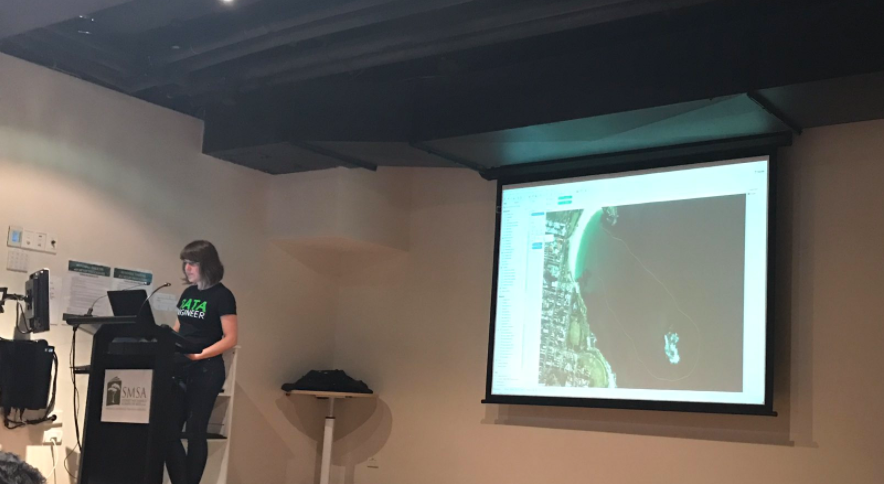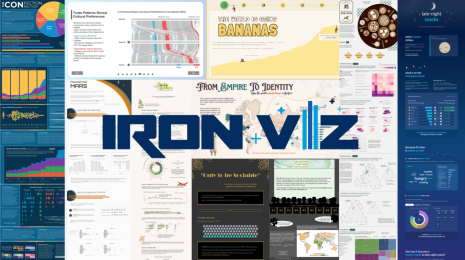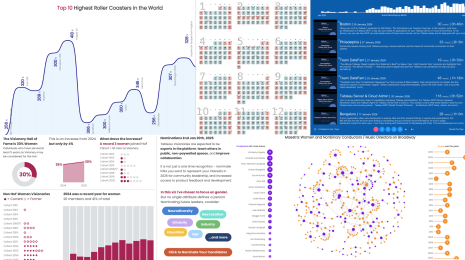7 ways to advance your analytics career
Note: The following is a guest post by Tableau Ambassador Eva Murray. Read her original post here.
If you want a data analytics job where you primarily get to use Tableau, but aren’t exactly sure what it takes to actually get that gig, this is the blog post for you.
It’s no secret that there is a lot of demand for people with solid data skills—and especially Tableau skills. In my current role at EXASOL, which I started in August 2016, I get to connect the right people, resources, and opportunities to ensure they get the most value out of their analytics tools.
While landing this job and other jobs where I’ve used Tableau, I’ve seen first-hand the requirements, hard and soft skills it takes to get the offer. Here are some great things I've learned to increase your chances of landing a job that uses Tableau.
For starters, you’ll need the chops to effectively derive insights from data with Tableau. In addition, it’s equally important to be able to effectively communicate all of the information to your stakeholders.
Even if this seems pretty obvious, you might be asking, “Okay, but how do I get to a higher level of competence and confidence?”
Fear not, I’ve curated a short list of what you can do now to boost your Tableau skills and propel your career in analytics.
1. Use Tableau everyday
If you want to ramp up your Tableau usage, but are getting hung up on looking for projects to work on, or if you’re just burnt out on playing with the Superstore Sales data set that comes with Tableau desktop, try practicing your skills with Makeover Monday. #MakeoverMonday is a social data project started by Andy Kriebel as a way to practice using Tableau. In 2016 he was joined by Andy Cotgreave, and the duo turned it into a regular challenge for the Tableau community (other tools are welcome, too). In 2017 I took Andy Cotgreave’s spot, and now run Makeover Monday with Andy K to bring you a fresh dataset to visualize every week. We also share articles and vizzes that you can take a stab at making over and improving on. This community is very active on Twitter, and you’re sure to find support, feedback and lots of inspiration every week.

If you’re keen to step it up, and work your way through some more advanced data visualization challenges, join #WorkoutWednesday, where you are given a viz to recreate every week. You’ll do the exercise based on the image you see, which will not be easy, but it will be a great way for you to flex your Tableau muscles in ways you never have before.
You can also try vizzing together. Try collaborating with others in your current organization, finding Tableau groups through Meetup.com, or even better, join a Tableau User Group.
Together, you’ll work with others through viz challenges, which will inspire everyone to ask questions and discover new ways enhance skills. But more importantly, you’ll start to foster and grow your Tableau network--you’ll be geeking out with people over the same things, and might even hear about a job opportunity along the way (more on this below).
2. Get Tableau certified
A professional certification will certainly help you stand out from the crowd. When you're ready, get Tableau certified. You can start by attending a formal Tableau training. The reason I don’t list this first is because there are so many (free) ways you can improve your skills — and they are easy to start. But attending a formal training course is an excellent way to learn how to use the tool most effectively and efficiently. If you have the opportunity to take a training course, do it. (Quick tip: use Tableau as much as possible leading up to the course. That way you can focus on learning more from the trainer, rather than still figuring out which buttons to click.)
Tableau offers formal certification exams that help you demonstrate your skill level. And don’t forget to toot your Tableau horn by putting your certification on your resume and LinkedIn profile.
3. Present your work
If this sounds like an odd point to include in this list, it isn’t. It is critical to be able to tell a data story, and verbally explain your findings with others in your organization. Often times, your insights will be essential for decision making, so you’ll need some solid presentation skills to make your case. You can practice these skills by demoing Tableau.
Using a workbook of your choosing, you can walk someone through how to use Tableau. Because you’re not just showing static images, but data visualizations within the software, you’ll need to be very precise and deliberate in all your mouse actions and word choices. Also, make sure to slow things down for the audience to ensure they can follow what you’re showing on screen.
Practicing demos will help you find the shortest path to solutions with the minimal amounts of clicks. It will also, once again, ensure you’re able to explain yourself well, which in turn shows you how well you’ve understood a concept yourself.

And finally, the best way to understand how much you know is to teach something to someone else. As you grow your own skills, make an effort to help others too. Teaching will quickly show you what you really know and what you don’t. Make sure to ask for feedback from others on your ability to explain analytical concepts and complex calculations.
4. Publish your work
Tableau Public is one of the key tools you’ll want to use to support all of the above. Why? Because Tableau Public is the platform for sharing your work and growing your own portfolio. You can publish all your vizzes and showcase your skills. Everything you publish will be public, so don’t publish work stuff. But you can recreate the design of your work dashboards with superstore data, or other public datasets before publishing.
Over time you may get noticed for your vizzes, your creativity, and your specific expertise. Your vizzes will reflect how your skills are growing, and you might even start to make a name for yourself. Embarrassed by your first two dashboards? Don’t worry — and don't delete them. No really, don’t delete them. You’ve shown progress, that’s what matters, and by keeping your first vizzes published and accessible people can see how far you’ve come.
Publishing doesn’t always have to be about self-promotion. It’s more about ensuring that your work is visible. This industry is global, and most communication and interaction happens virtually, so the only way for someone to notice you is if you have an online presence. Beef up your Tableau Public profile with your visualizations. Also, consider blogging, publishing on LinkedIn, and even joining a Twitter conversation. It will help you land the gig.
5. Get other technical skills
So you’re proficient with Tableau, but what other skills go hand-in-hand with that Tableau job you’re looking for?
Think and learn about other technical skills like working with databases, having a solid understanding of statistics, knowing how to gather data from various sources, and bringing it together in a way that allows you to do the visual analytics in Tableau. Various tools exist for these components of the job, and what you use will largely depend on what’s available in your workplace. Be willing and ready to learn a new tool that works in tandem with Tableau.
6. Think about your soft skills
Soft skills are impossible to quantify, but they are hugely important for the success of your Tableau job. The standard skills around teamwork and communication still apply, but I think in a Tableau context they can look a little different.
Communicate clearly and concisely. This is not about short email; it’s about using your data visualizations and dashboards as an effective means to share information and insights. Continuously look at your work and re-evaluate whether you have used the canvas to your full advantage.
Are your chart titles clear? Have you guided the viewer through your analysis? Are colors, shapes, and other objects easy to understand? Do you really need the logo for an internal report, or could you put something more important in its place? Is your dashboard clean and neat? Is the font easy to read?
Divide and conquer – work together. Most organizations require you to be a team player, at least some of the time. Yes, you’ll need to be able to work on your own and develop data visualizations that come together in reports to be shared. But along the way, you will most likely work with a number of people inside and outside your team to get access to the relevant data, systems and resources. You will also have to gain a good understanding for different areas of your organization, and develop trust with subject matter experts to improve the analysis of the performance of your business. Plan to work with IT teams responsible for the data, as well as business users who will eventually consume your dashboards.
7. Put yourself out there
It will be hard to hear about Tableau job opportunities unless you talk to the right people. So, network! When you’re involved in Tableau communities, you’ll get inspired from what other Tableau enthusiasts are doing and be more likely to stumble upon a job opportunity.
Go to events, join a Tableau User Group, and even attend Tableau’s one-of-a-kind annual conference. You’ll find hundreds of ways to learn what makes people successful in their roles. Above all, you'll have a great time with people who geek out over the same stuff as you. Remember, if you’re still reading this, the Tableau community is what clearly differentiates Tableau from its competitors, so make use of it as much as you can.

Then it’s about talking to people, connecting with them, and starting conversations. Ask questions. And don’t just ask for a job. Find out what organizations need, what they’re doing with their data and what their challenges are. What can you offer them? What value can you add? Once you have figured that out, you can move the discussion to job opportunities.
Let’s help each other
When we focus on helping each other become the best Tableau analysts/developers/design gurus, the opportunities will come for all of us. So go out there, get exceptionally good at what you do and see where it takes you. And tell us about your journey to your ‘Tableau job’, we’d love to hear your story!






